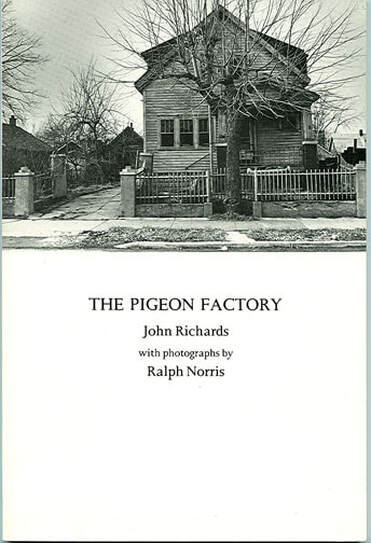|
By the author of Working Stiff, this collection of eleven short stories rips into Rustbowl Detroit with Richards' usual switchblade precision, humor and an hallucinatory prose. The stories are accompanied by fourteen photographs by Ralph Norris which fit the stories and place like a glove. |
The Pigeon Factory
by John Richards photographic illustrations by Ralph Norris First edition 1987 100 pages, 6" x 9" ISBN 0-932274-40-4 $8.95 About the Book
The Pigeon Factory is a book about misery, death, madness and disintegration. Spools of wire wrap around a man's heart, legs fall off, cities crumble, fists clench and unclench in nightmare hotel rooms. The sky falls in, piles of maggoty corpses chatter on forever. So why am I smiling? Because this is beautiful writing. Richards' prose bursts with life, mirth and a spirit of victory. — Lucia Berlin Cool his stories are not; heated and hallucinated to the point of surreal nightmare, these interlinking stories describe the landscape of an industrial inferno called “Detroit” envisioned as “a desert in the shape of a city.” Refugees flee from one place to another without explanation, the sky falls in solid crushing slabs, corpses chatter without respite and people take on the dehumanizing aspects of the tools and machinery they ply at their jobs. Bristling with a kind of creative anarchy, the book gleefully wages a frontal assault on the ideas of rational cause and effect. The force that seems to have called these tales into being is the attempt to breathe life and animation—at times aggressively, at others comically—into lifeless surroundings in vivid, expressionistic colors. Using an epigraph from Celine's Journey to the End of Night—“Next day I boarded a train for Detroit where I'd heard it was easy to get taken on at a lot of little jobs that weren't too hard and were well paid” Richards ironically intends to set straight that most street-smart and otherwise unillusioned of modern writers. One of the most convincing leitmotifs woven through the various stories and bearing the full force of lived experience is the recurring lament for the fathers who “entered factories in droves, channeled between cyclone fences into passages so narrow their cigarettes burned holes in each other's pants.” Throughout, there is an indictment of a system in which Every shoe was squeezed from a father who knuckled under the powerful hands of a time clock, every shoe was two or three hours of bitterness under the carnal eye of a foreman . . . and children, whooping down the street, joyful, wild, tore them to shreds on the rough concrete. The accompanying black-and-white photos by Ralph Norris are stark and frozen still in their presentation of gritty Rustbowl Detroit and serve as eloquently mute counterpoint to the live-wire prose. — Jack Marshall, from "Creative Anarchy in Rustbowl Detroit" THE SAN FRANCISCO CHRONICLE, July 12, 1987 When artists, writers and poets look at Detroit, they usually express it as a place that's raw, full of harsh edges and grit. They fill it with the colors rejected by the rainbow. There's nothing fond nor sentimental about the place: it's real. Then along comes John Richards with something completely different. Richards has been able to capture the spirit of Detroit while eschewing reality. His slim volume of interconnected stories, The Pigeon Factory is gritty all right, but in place of the real he offers us surreal, minor and major hallucinations that still manage to evoke the intensity, gutsiness and absurdity of our town. The accompanying photos, primarily of decay, are by Ralph Norris. — John Barron DETROIT MONTHLY, November 1987 The stories create a surreal, profoundly alienated and yet oddly engaged memoir of a rustbowl Detroit of the soul. Each of the narratives constitutes a vivid plunge into that interior world or mindscape. . . . The photos and texts obliquely “recognize” each other, although there is no obvious pairing of image and text. The surfaces of both seem to float above a deep foreboding; an ominous, paranoid sense of a huge force constantly flowing threatens to well up and engulf the contingent narrative structure. The inhabitants of this Detroit are fabled as interchangeable parts of a monstrous, worn-out machine, a system of production which for a time converted nature into commodities, and whose by-products were toxic wastes and wasted lives. Now it seems that blind nature is convulsively purging itself of this disease. In this organismic, nightmare vision, Detroit's time is past, its present a true night of the living dead, and we all live in our own Detroits. — John Bryum SMALL PRESS, October 1987 The Pigeon Factory is a book in which absolute despair is coupled with a vibrant hope. It's not enough to say life's a bitch. Richards cuts through the crap with a witty scythe and is able to find joy in a suffocating smokestack of poverty, darkness and despair. — David Bornstein THE BORDERS REVIEW |
Cadmus Editions
[email protected]
[email protected]

